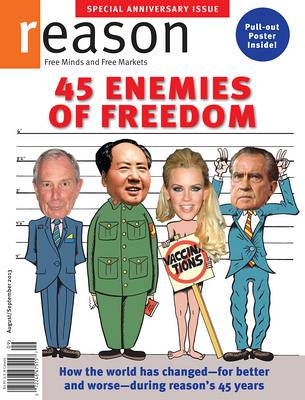Democrats Hate Wealthy Candidates…When They're Not Democrats
Who's ready for a class war from the party of John Kerry, Hillary Clinton, Michael Bloomberg, and the Kennedy/Roosevelt clans?

"Howard Schultz is a jackass," Philippe Reines, the longtime Democratic communications specialist and former Obama administration deputy assistant secretary of state, told Axios this week. "He's arrogant and wealthy—and those people tend to not see the world as it is."
Reines is nothing if not experienced with wealthy political candidates who have a reputation for arrogance. He worked early in his career for Jane Harman, one of the richest members of Congress. He's the co-founder of Beacon Global Strategies, a Washington defense/security consultancy that traffics in international murk and represented at least three 2016 presidential contenders. And Reines's longtime boss Hillary Clinton (who incidentally thought highly enough of Schultz to have tabbed him as a potential secretary of labor) was estimated to be worth $15 million when she ran for president in 2016, padded in part by charging the likes of Goldman Sachs $225,000 per speech. (Clinton's husband Bill was worth an additional $80 million, it was estimated at the time.)
Democratic revulsion at candidates' wealth, on splenetic display all week, has been nakedly situational in the 21st century. Four years after nominating John Kerry, one of the richest presidential candidates in U.S. history (estimated net worth $200 million, and that's not counting his much richer wife), Democrats spent their 2008 national convention lambasting John McCain's seven houses. "I suppose if you've got seven, maybe eight houses, the economy looks fundamentally sound to you," candidate Barack Obama said on the campaign trail. "But if you're having trouble making the mortgage payment…then the economy looks awful different."
As evidenced by the "For the 99.8% Act" unveiled today by Sen. Bernie Sanders (I–Vt.), as well as the "tippy-top" tax envisioned by Sen. Elizabeth Warren (D–Mass.), soaking—and insulting—the rich is all the left-of-center rage this cycle. "Democrats should do the pragmatic thing in 2020," New York magazine's Eric Levitz advised this week, "and wage a vicious class war."

If so, snipers are going to first have to take out some of the party's own 2020 presidential candidates. The estimated worth of Michael Bloomberg, for example, is $47.6 billion, good for 14th place on the planet. Former Rep. John Delaney, whose 2020 bid touts campaign finance reform, was estimated as the sixth wealthiest member of the previous Congress, with a net worth of $92.6 million. Tech entrepreneur and robotophobe Andrew Yang, who likes to warn against the wealth gap, is firmly on the other side of it. Self-help guru and Oprah Winfrey spiritual adviser Marianne Williamson—what, you didn't realize she was running?—is so salt-of-the-earthy that she announced her candidacy this week at the Saban Theatre in Beverly Hills. Join the evolution, indeed.
But the real challenge in any proper class war is figuring out where exactly to draw the battle lines. Sure, Bloomberg and his lesser-known fellow richies in the field will be among the first against the wall, but what about Beat poet Beto O'Rourke and his estimated net worth of $9 million? Elizabeth Warren may talk a good anti-1-percent game, but she ain't part of the 99. Yes, Bernie Sanders is on the lower end of the Senate's wealth scale, but does he really need all three of those homes?
Complicating any class-war plans is the fact that the 13 richest congressional districts in the country, and 41 of the top 50, are now represented by Democrats. The presidential voting preference among the top 4 percent flipped Democratic in 2012 for the first time in a half-century and hasn't looked back since. If there's a party of the rich, it's not the GOP.
So enjoy the wealth-bashing primary season while it lasts, Jacobin friends! Soon enough the party of John F. Kennedy (estimated net worth: $100 million) and Howard Schultz's very favorite Democrat of the past 50 years, Franklin Delano Roosevelt ($60 million), will get back to the business of attracting rich voters and donors and candidates by insisting that they're only going after people precisely as rich as Howard Schultz and Donald Trump.


Show Comments (194)